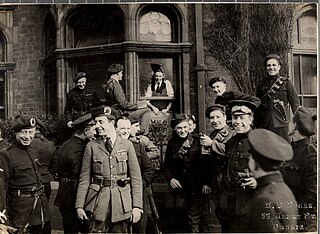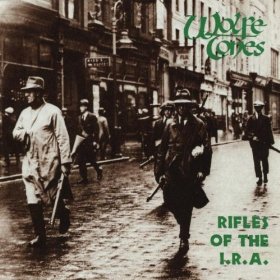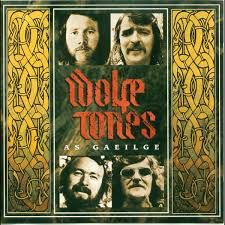
Theobald Wolfe Tone, posthumously known as Wolfe Tone, was a leading Irish revolutionary figure and one of the founding members in Belfast and Dublin of the United Irishmen, a republican society determined to end British rule, and achieve accountable government, in Ireland. Throughout his political career, Tone was involved in a number of military engagements against the British navy. He was active in drawing Irish Catholics and Protestants together in the United cause, and in soliciting French assistance for a general insurrection. In November 1798, on his second attempt to land in Ireland with French troops and supplies, he was captured by British naval forces. The United Irish risings of the summer had already been crushed. Tone died in advance of his scheduled execution, probably, as modern scholars generally believe, by his own hand.
"The Men Behind the Wire" is a song written and composed by Paddy McGuigan of the Barleycorn folk group in the aftermath of Operation Demetrius.
In the music of Ireland, Irish rebel songs refer to folk songs which are primarily about the various rebellions against English Crown rule. Songs about prior rebellions are a popular topic of choice among musicians which supported Irish nationalism and republicanism. In the 20th and 21st centuries, Irish rebel songs focus on physical force Irish republicanism in the context of the Troubles in Northern Ireland.

The Wolfe Tones are an Irish rebel music band that incorporate Irish traditional music in their songs. Formed in 1963, they take their name from Theobald Wolfe Tone, one of the leaders of the Irish Rebellion of 1798, with the double meaning of a wolf tone – a spurious sound that can affect instruments of the violin family.

The Irish Rebellion of 1798 was a major uprising against British rule in Ireland. The main organising force was the Society of United Irishmen, a republican revolutionary group influenced by the ideas of the American and French revolutions: originally formed by Presbyterian radicals angry at being shut out of power by the Anglican establishment, they were joined by many from the majority Catholic population.
"Follow Me Up to Carlow" is an Irish folk song celebrating the defeat of an army of 3,000 English soldiers by Fiach Mac Aodh Ó Broin at the Battle of Glenmalure, during the Second Desmond Rebellion in 1580.

Come Out, Ye Black and Tans is an Irish rebel song referring to the Black and Tans, or "special reserve constables", recruited in Great Britain and sent to Ireland from 1920, to reinforce the Royal Irish Constabulary (RIC) during the Irish War of Independence. The song was written by Dominic Behan as a tribute to his Irish Republican Army (IRA) father Stephen, who had fought in the War of Independence, and is concerned with political divisions in working-class Dublin of the 1920s. The song uses the term "Black and Tans" in the pejorative sense against people living in Dublin, both Irish Catholic and Protestant, who were pro-British. The most notable recording was in 1972 by the Irish traditional music group, the Wolfe Tones, which re-charted in 2020.

Derek Warfield is an Irish singer, songwriter, historian, and a former member of the musical group The Wolfe Tones.
Patrick Brian Warfield is the vocalist, banjo, harp and bodhrán player and lead songwriter with long-standing Irish band The Wolfe Tones. Brian introduces many of the songs at the Wolfe Tones live concerts and is a keen historian.
"The Dying Rebel" is a popular Irish rebel song about a man finding a dying Irish rebel from County Cork in Dublin during the 1916 Easter Rising. Its age is uncertain, but it is still sung by contemporary Irish singers.
Down by the Glenside (The Bold Fenian Men) is an Irish rebel song written by Peadar Kearney, an Irish Republican and composer of numerous rebel songs, including "The Soldier's Song" ("Amhrán na bhFiann"), now the Irish National Anthem, and "The Tri-coloured Ribbon".

Arthur Wolfe, 1st Viscount Kilwarden was an Anglo-Irish peer, politician and judge, who held office as Lord Chief Justice of Ireland. He was assassinated during the Irish rebellion of 1803.

The discography of The Wolfe Tones, an Irish folk and rebel group from the suburbs of Dublin, consists of sixteen studio albums, three extended plays, three live albums and ten compilation albums. The Wolfe Tones released their first album with Fontana Records in 1965 and released their most recent studio album with Shanachie Records in 2004. In the interim, the band has also released albums with Dolphin Records, Triskel Records and MCA.

The Rights of Man is the third album by Irish folk and rebel band The Wolfe Tones. The album features songs of various themes including Irish republicanism and emigration.

Rifles of the I.R.A. is the fourth album by Irish folk and rebel band The Wolfe Tones. The album title Rifles of the I.R.A. makes reference to the Irish Republican Army (IRA).

As Gaeilge is the eleventh album by Irish folk and rebel band The Wolfe Tones. The title translates as "In Irish" and the album is entirely recorded in the Irish language.

You'll Never Beat the Irish is the sixteenth album by Irish folk and rebel band The Wolfe Tones. This album was the first recorded and released by the band without founding member Derek Warfield, who had departed earlier the same year.

Child of Destiny is the eighteenth album by Irish folk and rebel band The Wolfe Tones.
Celtic Symphony is a song by The Wolfe Tones, written to celebrate the centenary of Celtic Football Club. It has become a staple song for Irish nationalism and Irish sports teams which has led to controversy due to its lyrics.












